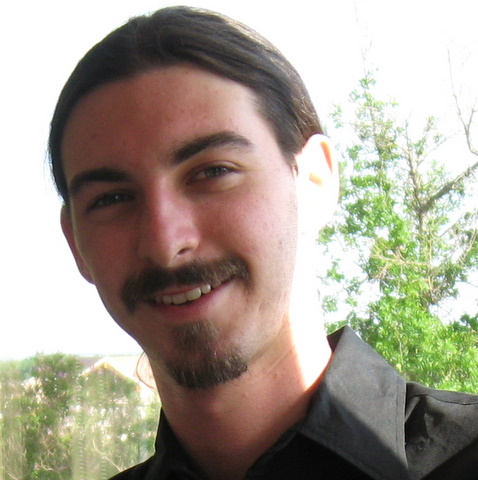Workshops
Mapping the History and Philosophy of Science
Date:
June 17-June 18, 2009
Meeting Place:
Indiana University Bloomington, SLIS, Wells Library 001
(Directions to Library)
Map of conference & housing
Photos:
Organizers:

Katy Börner
Associate Professor of Information Science, SLIS,
Indiana University. Director, Cyberinfrastructure for Network Science Center.
Curator of Mapping Science exhibit.
katy@indiana.edu
PR^2 | Slides

Colin Allen
Professor, of Hist. & Phil. of Science and Professor of Cognitive Science, College of Arts & Sciences, Indiana University. Director of Indiana Philosophy Ontology Project.
colallen@indiana.edu
PR^2 | Slides
Workshop Goals & Agenda:
This is a small-scale workshop that brings together History and Philosophy of Science (HPS) researchers that like to dig in data and science map makers that model and map the landscape of science, see http://scimaps.org for sample maps. The goal of the workshop is to explore synergies between these two research areas in terms of
- Demonstration of existing approaches, tools, and techniques and discussion of synergies.
- Discussion of different conceptualizations, existing datasets and tools.
- Identification of opportunities and challenges.
This is a 1 ½ day workshop. Given the diverse backgrounds of the attendees and the goals of the workshop, we will use the first ½ day for brief self introductions of the participants, followed by three 30 min overview talks that set the stage for the workshop. The day concludes with a discussion of challenges and opportunities and a shared dinner. The second full day features brainstorming and discussion sessions in different team sizes and combinations. All sessions take place in Room LI001, Herman B Wells Library, IUB.
Schedule:
Wednesday, June 17th, 2009
| 12:00pm | Welcome by Organizers PPT |
| 12:15pm | Introduction by Participants (7 min per person/organization = 22 slots) Led by Colin Allen |
| 3:00pm | Break |
| 3:30pm | Overview Talks
|
| 5:00pm | Break |
| 5:30pm | Discussion of Opportunities and Challenges Led by Colin Allen & Katy Borner |
| 6:30pm | Adjourn |
| 7:00pm | Joint dinner at Siam House, 430 E 4th Street, (812) 331-1233 |
Thursday June 18th, 2009
| 9:00am | Light Breakfast |
| 9:30am | Breakout Session on “Collaboration Opportunities”. |
| 11:00am | Breakout Session Reports |
| 11:30am | 2nd Best Ideas |
| 12:00pm | Joint Lunch |
| 1:00pm | Breakout Session on “Conceptualizations, Datasets, and Tools”
|
| 2:00pm |
Breakout Session Reports |
| 2:30pm |
Break |
| 3:00pm |
Breakout Session on “Opportunities and Challenges” |
| 4:00pm |
Breakout Session Reports |
| 4:30pm |
Discussion of Next Steps, Funding Opportunities, etc. [PPT] |
| 5:00pm |
Adjourn |
Participants Attending:

Zvi Biener
Assistant Professor, Philosophy, Philosophy and History of Science, Western Michigan University
PR^2

Kevin Boyack
Science analyst, SciTech Strategies, Inc. Author in Mapping Science exhibit.
PR^2 | Slides

John Bruer
President, James S. McDonnell Foundation, adjunct professor of Philosophy, Washington University, St. Louis
PR^2 | Slides

Jordi Cat
Professor, History and Philosophy of Science, IUB, and co founder of the IU 19th-Century Studies Group

Jean-Gabriel Ganascia
Professor of Computer Science, Paris VI University, team Led, Laboratoire d'informatique de Paris 6, and the ACASA, Cognitive Agents and Automated Symbolic Learning
PR^2 | Slides

Russell Jackson Duhon
Senior Software Developer
Cyberinfrastructure for Network Science Center

John Walsh
Assistant Professor, School of Library and Information Science, Indiana University
PR^2

Noretta Koertge
Emerita, Professor of History and Philosophy of Science, Editor-in-Chief, New Dictionary of Scientific Biography
PR^2 | Slides

Scott Weingart
Recent UF graduate, soon IU Research Assistant
weingart.scott@gmail.com
PR^2 / Slides

Alex S. Pang
Research Director, Institute for the Future; Content Led/information ecologist, Signtfic. Author in Places and Spaces: Mapping Science.
PR^2

Osvaldo Pesso Jr.
Professor of Philosophy in the Faculty of Philosophy, Letters and Human Sciences, University of São Paulo, Brazil.
PR^2

Andrew Ravenscroft
Professor of Technology Enhanced Learning, Deputy Director, Learning Technology Research Institute (LTRI)
PR^2 | Slides

Andrea Scharnhorst
Senior Research Fellow & Founding Member, Virtual Knowledge Studio for the Humanities and Social Sciences, Royal Netherlands Academy of Arts and Sciences
PR^2 / Slides

André Skupin
Associate Professor, Department of Geography, San Diego State University. Author in Places and Spaces: Mapping Science.
PR^2

Chris Sula
Doctoral Candidate in Philosophy at the CUNY Graduate Center; Doctoral certificate program in Interactive Technology and Pedagogy; Adjunct lecturer at Lehman College
PR^2 | Slides

Caroline Wagner
Senior Analyst, SRI International, Research Scientist, George Washington University, Author, The New Invisible College: Science for Development (Brookings Press, 2007)
PR^2 / Slides

Anthony Beavers
Professor of Philosophy, Director of the Cognitive Science Program, University of Evansville
PR^2

Edward Zalta
Senior Research Scholar at the Center for the Study of Language and Information (CSLI) and principal Editor of the Stanford Encyclopedia of Philosophy, Stanford Univeristy
PR^2

Angela Zoss
Research Assistant
Cyberinfrastructure for Network Science Center
Ph.D. Student, SLIS
PR^2
Interested But Cannot Attend:

Stephen Griffin
Program Director, NSF

Yves Gingras
Professor, Department of History, Université du Québec à Montréal, Co-Founder and Scientific Director of the Observatoire des sciences et des technologies.
PR^2

Israel Lederhendler
NIH/OD
Travel/Housing:
The map below shows a floor plan of the lower level. Blue highlighted rooms house the Cyberinfrastructure for Network Science Center.
Room 001in the upper left corner of the map is the workshop venue.

Restrooms are next to 036 (no room number) accessible by keylock 2-3-4-1-*
Housing at Wilkie Quad (below right)

Rooms have been reserved in the Wilkie Quad for out of town participants. The Wilkie Quad operates like a hotel. Please check in at the North Tower Desk to receive a room key.
Acknowledgments:
The workshop is funded by an National Science Foundation IIS-0715303 award and the James S. McDonnell Foundation.

db page






